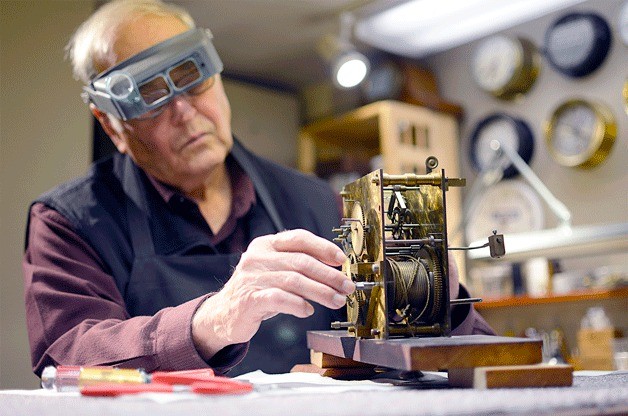In the heart of downtown Langley is a little store where time stands still. It’s a place of warm incandescent light, little brass gears, tiny screws and old-world craftsmanship.
It’s also a space that one would expect to resound with a cacophony of ticks, tocks and cuckoos, but is instead strangely silent.
This is Langley Clock & Gallery, an antique watch and clock repair/retail art business on Frick Lane, a tiny alley nestled between bustling First and Second streets. Its owners are Herb and Marilyn Helsel. They’re both mad about old clocks, but it’s Herb who knows what makes them tick.
The 78-year-old’s daily uniform is a simple black apron and a magnifying eyeglass visor, the kind usually seen on jewelers. His work area contains lathes, drills with bits the size of sewing needles, miniature anvils to match and thousands of tiny brass parts neatly stored in organizers resembling fishing-lure tackle boxes.
Few clocks in the shop are less than a century old, and none are too ancient for Helsel to fix. He considers himself a master of his craft. He doesn’t “tinker.”
People come in and say, “I have an old watch, can you tinker with it?’ I say, ‘No, but I can repair it.”
Years ago, the store ran the length of the building and the couple had up to 600 clocks for sale at a time. They sold and shipped them to customers across the country. But things have changed. Keeping all the clocks wound and chirping is too much work, and, often the sign on the front window says, “Closed.”
“We’re mostly open by appointment these days,” Herb says.
The change of pace is largely due to the couple’s purposeful move toward a soft retirement; clock repair will continue as long as possible but retail sales will go with existing inventory. But there are other reasons for the slow pace as well. In a digital world that seems to increasingly “beep” rather than “gong,” mechanical or and antique clock repair is an industry that’s winding down.
Those skilled enough to be considered real craftsman, those like Helsel, have become a rare breed.
“I don’t like the word dying, but it is disappearing, yes,” Helsel said.
Just how many of Helsel’s counterparts are still in business in Western Washington is unclear. Robert Reichel, 94, who has been in the trade for 45 years, owns Seattle-based Antique Clock Repair and is longtime member of the National Association of Watch and Clock Collectors, said “very, very few.” Tom Payne, 81, owner of Watch & Battery Center in Seattle and a founder of Norwest School of Horology, also in Seattle, said “damn few.”
“We’re falling right behind buggy whips,” Payne said. “They went out 100 years ago and we’re right behind them.”
They say it’s a natural progression, the result of an age revolutionized by the “quartz industry,” iPods and iWatches. Reichel believes they also share some of the blame, saying they didn’t adequately stoke the flames for the next generation by passing on their knowledge and passion for antique clocks.
“We’re like the Elks and Masons,” he said. “We didn’t feed the kettle and now there is no one to take our place.”
But that isn’t always the case. Payne’s grandson works in his store and wants to take over the business. He makes digital watches with parts from Hong Kong. They keep time accurately, just like the mechanical wonders of another era and the fancier watches that are now all the rage, such as the iWatch, he said.
The industry is changing, and people probably can’t make a living solely repairing antiques anymore. But there will always be those who love and value ancient time pieces, Payne said. It takes years of study to become an expert, and those who do it now and those who will do it tomorrow aren’t in it for the money. It’s a passion, Payne said.
Helsel agrees.
“There’s a certain romance to old clocks,” he said, and that’s something that will never go out of style.
The people and the history are fun too. Helsel once fixed a watch for a Whidbey man whose grandfather was John Burke, the 23rd treasurer of the United States (April 1, 1913 to Jan. 5, 1921), appointed by President Woodrow Wilson. More recently, he fixed a watch owned by a Seattle doctor. The date Jan. 20, 1915 was etched inside. Helsel inscribed next to it the date of his repair, Jan. 20, 2015.
“How cool is that?” Helsel said.
Helsel is thankful to his uncle, Charles Helsel, for getting him into the trade decades ago. He and Marilyn owned a motorcycle dealership in an earlier life in Oregon, and it was Uncle “Charlie” who got him hooked and helped them start a new chapter in Langley.
Although he’s returned Uncle Charlie’s favor by taking a few interested people under his wing over the years, there’s no clear “prospects” for a successor at the moment, he said. He’s still hoping to find someone, but Helsel said it seems likely that when the store eventually closes it will be for good.
Business leaders say that day will be a loss for Langley, a city that relies on its reputation as a charming island town with eclectic businesses. According to Michaleen McGarry, executive director of the Langley Chamber of Commerce, the Helsels’ shop not only offers a real service, as people still need clocks fixed, but it’s one of the stores that help define the city’s character.
“There’s a few places like that you just don’t want to see go,” she said.



